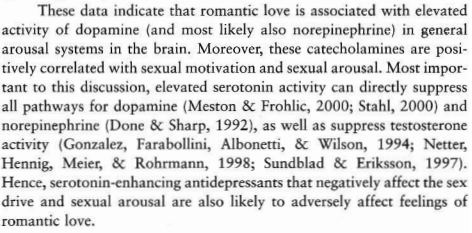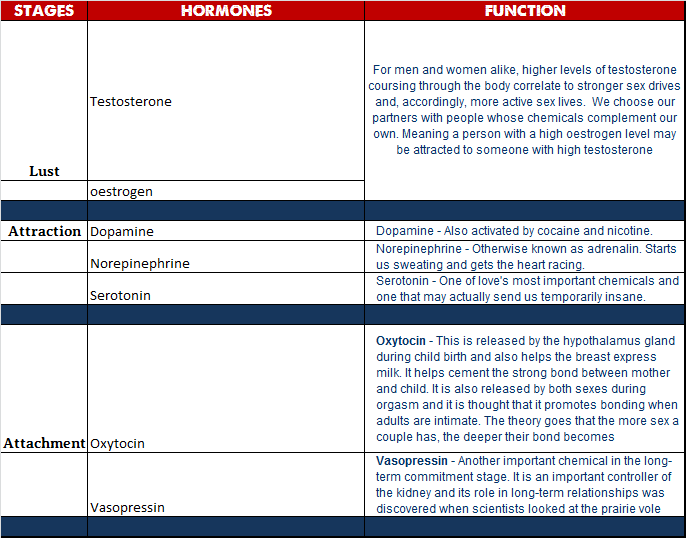The Science of Lust: How men buy glasses and women become helpful!
Marilyn Monroe once said that sex is the opposite of love. That may not be a very accurate way of looking at things but it shows how people have critically looked at lust, desire and love. The feelings of desire and lust in both, men and women, unknowingly lead them into doing things, that they may not otherwise. The lives and experiences of Bill Clinton and Tiger Woods are well known. Although it must be said that the strength of lust and its impact is no less on women. They may choose to be more discreet.
How desire, lust and love impacts a person’s overall personality has been a very interesting study. Its implications are so widespread within humanity and so deeply ingrained in our DNAs that we are seldom aware of them. Something that many companies and organizations use to great advantage.
Evolutionary Biology is a subject which deals with the scientific basis for our behavior. An area which goes into how our evolution and development as humans from initial times to now, have impacted our fundamental behavior and how its variants impact our daily choices.
As much as we know, this is nevertheless a nascent science and we are constantly learning how work on one side of our emotional state impacts other areas. Before we explore the very interesting impacts of lust, love and desires; let us first take a look at the mechanics and chemistry of these feelings in our body.
Lust – Do we know enough?
These states of our mental being – lust, love and desires – create an interesting chemical cocktail in our body that impacts everything from our brain to our heart to our blood flow and our energy levels. If we look at these things in isolation we run the risk of badly skewing a person’s overall well being. In a study titled “Lust, Romance, Attachment: Do the Side Effects of Serotonin-Enhancing Antidepressants Jeopardize Romantic Love, Marriage, and Fertility?” by Helen E. Fisher and J. Anderson Thomson Jr., the results indicated the following interesting impact of the anti-depressants:

Dopamine is a neurotransmitter, a chemical released by nerve cells to send signals to other nerve cells. This chemical is released by the brain as the centers that acknowledge the beginnings of lust become active. Dopamine, however, plays far too many functions in a body related from attention to handling of pain, addiction, feminism and many more. Vaughan Bell has an interesting way of explaining it:
If there were a celebrity among brain chemicals, it would be dopamine. Supposedly released whenever we experience something pleasurable, it’s forever linked to salacious stories of sex, drugs, and wild partying in the popular press. The Kim Kardashian of neurotransmitters, it gives instant appeal to listless reporting and gives editors an excuse to drop some booty on the science pages.
The whole sequence from lust to love has been broken down by Helen Fisher in three stages. Each stage has its own set of chemicals playing their part. Here is how it all plays out. (Content courtesy: BBC)

Science of Lust and Love
“She looked like the kind of woman I could fall in love with. Trouble is, she was standing next to the kind of woman I’d like to make love to. ” ― Jarod Kintz, This Book Has No TitleThe tussle between the need to love and lust has always gone on. Consequently, there also has been this tension between lovers where one constantly worries if love is really loving or just lust?
At a more scientific and even relationship level, lust is related to desire, while love for one is linked to attachment to that person at the exclusion of all else. In a very interesting study represented in this documentary – Science of Lust – we find that when Men and Women were first asked to talk of their sexual/intimate relationship with their partner and then look at many pictures including some of the scantily clad members of the opposite sex, both genders’ gaze lingered a bit longer than on the other images. However, when this experiment was started with Men and Women talking about how much they loved their partners, they would hurriedly change the images (and spend the least time consequently) of the scantily clad members of the opposite sex.
This experiment showed how love created a sense of exclusive attachment, while lust was an emotion related to general desire. There is a sense of attachment and being committed to one partner in love. In lust, such an exclusive attachment is probably not there.
Spiritual minds give another way of looking at this as well, which has a very different take. In their view, Lust is attachment to one, while Love is more an expression of giving universally.
When lust is transformed and you enter into the city of love, you enter unattached. Remember, that is their definition of love. If love has attachment in it, it is lust, If love has no attachment in it, only then is it not lust. When you are in lust you are not really thinking of the other, thinking of your beloved or lover. You are simply using the other for your own ends. And of course, attachment is bound to be there, because you would like to possess him, and you would like to possess him or her forever. Because tomorrow also you may need, the day after tomorrow also you may need. You need a lover and you want to possess him. LOVE is a gift. You give; you need not be worried about whether tomorrow he will be there to receive or not. Because a lover can give to the trees, to the rocks. A lover can give to the emptiness of the sky. A lover can simply flower and send his fragrance to the winds, even if nobody is there. Just think: Buddha sitting under his Bodhi tree, alone, full of love, overflowing…. Not that somebody is there to receive, but God is always there to receive, in so many forms, in so many ways. Lust is greed, lust is attachment, lust is possessiveness. Love needs no possession, love knows no attachment, because love is not greed. Love is a gift. It is a sharing. (Source: Osho, “The Beloved, Volume 2”)
Admittedly, that is the way of looking of an evolved being, unlike most of us, who trap love into committed and exclusive attention-seeking relationships.
Science of Lust: Are Men and Women the same?

Porn has been the most common way to elicit and measure the element of lust in people. Most of the porn world for the most part since historic times has focused on the depiction of women in explicit situations. But is porn’s impact only exclusive to men? Studies reveal an interesting twist.
In fact, studies by Meredith Chivers show that women react as strongly to porn as men do. In some cases, it seems that women actually react more strongly to porn than do men, as women respond with physiological arousal to visual depictions of almost any sexual activity, whereas men seem to be much more rigid and limited in what they respond to. But, whereas men respond with both physical and psychological arousal, women more frequently show physical arousal, at the same time they deny being turned on. So, women react to porn, they may just be unwilling or unable to acknowledge it – after all, they are taught from childhood that “good girls don’t do that!”
While men show a strong correlation between their physical and mental indicators of arousal, women deny that they are aroused even when the physical indicators show a much higher level of arousal than men. This dissonance has been genetically ingrained in women over the ages. There are two reasons for this – One, the social expectation of what a “good girl” is, and second, giving in to a sexually attractive man does not ensure a “good” long term partner. Women are wired to look for a “good” and “committed” partner as opposed to a physically attractive one!
The story doesn’t end here for women. Their desire for attractive men doesn’t get extinguished when they are with a “good” partner if that one happens to be “less masculine”.
A new study reveals that heterosexual women whose partners have less-masculine faces report more attraction to other men during ovulation. Women with masculine-looking partners said their eyes wander less, perhaps because the traits women tend to find sexy when they’re fertile are already present in their partners.
As expected, this attraction is only at the level of desire and does not translate into a need for such men to be “long term partners” – a preserve only for the “good males”.
“When they rate men’s sexiness, in a sense, that’s when they show the shift,” study co-author Steven Gangestad, a University of New Mexico evolutionary psychologist, told LiveScience. “If they rate men’s attractiveness as a long-term partner, then they don’t show it.”
So, if you are not a very “masculine” looking man, and your wife’s eyes wander onto other manly males, be rest assured – it is not because she wants him for the long term. Although she might be fantasizing about him when ovulating.
“What we found was that, indeed, women who are with less facially masculine men – so more feminine men – they’re the ones showing a shift toward men other than their partner,” Gangestad said. For instance, while ovulating, women were more likely to have sexual fantasies about a non-partner.
And that brings one to a disturbing probability for less “masculine” males’ relationships – can the fantasies of their women partners during fertility lead them to hook up with attractive strangers? Apparently yes.
Another study by Gangestad in the same issue of Evolution and Human Behavior finds that women surveyed during their fertile periods report more lust based on physical attraction and more willingness to hook up with an attractive stranger. Other studies suggest that men sense women’s fertility and react by becoming more attentive, Gangestad said, which can cause tensions in some couples.
Even though such attraction is temporary, it may lead to complications in this day and age of pervasive social media.
How do our emotions of Love, Lust, and Desire impact our Behavior?
Professor Vladas Griskevicius of the University of Minnesota studies Evolutionary Biology. He and other scientists have done detailed experiments to understand our behavioral patterns when the element of lust and desire for the opposite sex is added to the mix. The results have been mind-boggling to say the least. From how we choose our sunglasses, to our levels of creativity and also our sense of altruism – everything is impacted by our feelings of lust. Some of the interesting findings:
- When men are introduced to desire and lust – they become more aggressive, want to stand out in the crowd and their level of creative expression rises manifold!
- When women are introduced to desire and lust – they become more altruistic, committed, caring, and loving to everyone else around them.
Even an introduction of a desire-oriented environment changes the way people behave.
Some of what this documentary discusses are lessons that some companies may already be using to their advantage. In Victoria Secret stores, for example, the workers there target men differently than they target women.
“The general feeling about men is that they would buy anything in order to get out of the store as quickly as possible,” the worker, who wished to remain anonymous, told us. “That means they would spend more money.” While workers tell women about promotions like 5 for $25 panties, they are more likely to sell men full-priced merchandise, the worker said. “Women are more value-oriented, and so we were encouraged to show them deals,” she said. “Men would buy a couple of $50 bras without questioning us because they felt awkward.”
This inclination to buy expensive lingerie may not only have to do with the awkward feeling amongst men while sifting through women’s bras but also with their need to “stand out” – and therefore spend more on high-end products! A trait in men’s evolutionary mind that Victoria Secret store workers use to the hilt!
This sentiment in men is always targeted in ads that appeal to their sensual needs. Once a man is brought in that state, then it is easier to have him buy a product that is packaged as “Exclusive” or special!
So, next time you look at a product, an advertisement, a deal, or even an ambiance that is specially created for some impact on your baser mind, you will pause and think.
Btw, do you have any stories of your own to discuss in this context?




Comments ()